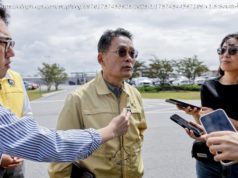Here’s how the president’s bets look when viewed through the lens of behavioral economics.
It may be difficult to discern given the high baseline of histrionic pronouncements by the White House, but President Trump’s policy toward North Korea is one of escalating claims for success. While non-proliferation experts and diplomats have cautioned that the administration needs to be more realistic in its expectations, the administration has been doing the exact opposite. Trump’s method has been described by a prominent New York Times expert on nuclear issues as “a bold and innovative approach.” Which is true: The president’s approach to foreign policy is an adventurous one that has not been attempted in American foreign policy for at least 70 years.
In fact, it calls to mind Daniel Kahnemann and Amos Tversky’s prospect theory in behavioral economics. So much so, that it may be considered a real-time, real-world experiment.
Prospect theory explores how people make decisions under considerations of varying risk. It also explores whether winning streaks and losing streaks really exist. Its major finding (for which Kahnemann and Tversky were awarded the Nobel Prize in economics) is that we tend to see “risk-aversion in choices involving sure gains and risk-seeking in choices involving sure losses.” That is, people are more risk-tolerant when attempting to regain what has been lost. So, a gambler who is winning will then confine herself to more probabilistically likely outcomes (safer bets), thereby increasing the likelihood of continued gains (a winning streak). But a gambler who’s losing will grow increasingly desperate to replenish her losses and make riskier bets.
It’s instructive to review the evolution of Trump’s North Korea policy in this light. His opening gambit was a long-odds bet that “maximum pressure” could precipitate that country negotiating away its nuclear weapons. When that failed to produce the intended result, Trump belittled North Korea’s leader, then bombastically threatened “fire and fury,” then impulsively agreed to a first-ever bilateral summit with that same leader, then advanced the notion that he (Trump) would deserve a Nobel Prize for Peace, then indulged in flattery of Kim Jong Un, then instructed the Pentagon to develop plans for withdrawing U. S. forces from Korea, then allowed his administration to claim the deal with North Korea would parallel Libya forsaking its chemical weapons, then called off the summit in a most unusual letter for the annals of diplomacy, then portrayed the cancellation as a negotiating tactic and dispatched envoys to North Korea to work out details for the summit.
Now, the summit is being revived with even more sensational expectations. Secretary of State Mike Pompeo described the meeting as a “once-in-a-lifetime opportunity to change the course for the world.” And the U. S. is making even greater demands, with Pompeo expanding the call for “complete, verifiable, and irreversible denuclearization of the Korean Peninsula” so that it includes not just weapons, but also North Korea’s fissile material, its nuclear infrastructure, and its long-range missile capability, including rocket engines and space launch vehicles.
To put it simply, Trump has a tendency to double down. He makes more outlandish claims when the truthfulness of his statements are challenged. He increases demands when they go unmet. He makes problems bigger when he can’t get what he wants. For example, having failed to force better terms out of Canada and Mexico in NAFTA negotiations, Trump has escalated from trade talks to trade war, levying tariffs of 25 percent and claiming national security necessity against America’s neighbors and closest allies.
Kahnemann and Tversky’s theory indicates that if Trump continues to rack up losses, his demands will become more and more exaggerated. It will not be enough for him to meet with Kim Jong Un—it will have to be the most important meeting of heads of state in history. He may even be willing to barter away American advantages in order to get any deal that allows him to claim success.
While big thinkers bemoan the lack of an American “grand strategy,” our foreign policy successes have resulted not from outsized bets, but from cautiously capitalizing on opportunities. Not from aggressively advancing ideology, but from letting many opportunities pass and taking only those which maximize potential gain at a minimum of risk. And that approach is antithetical to President Trump, especially since he doesn’t appear to be winning.






